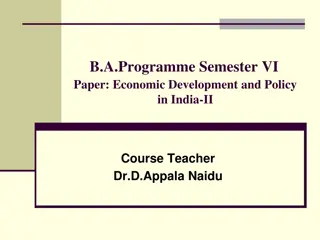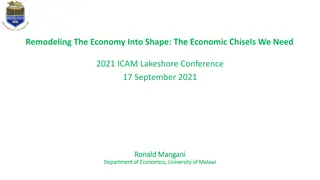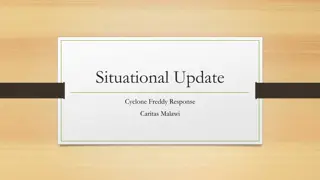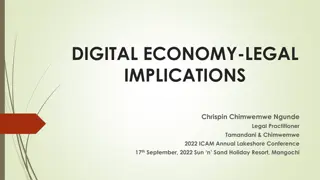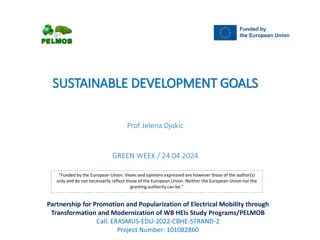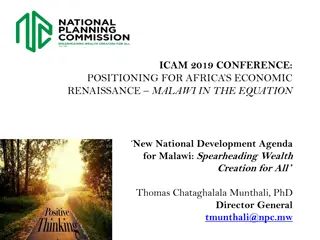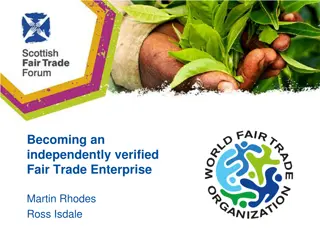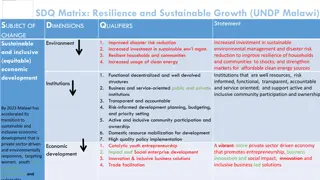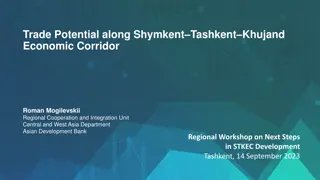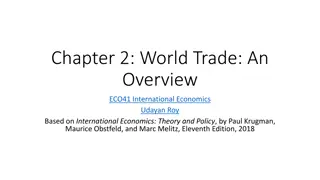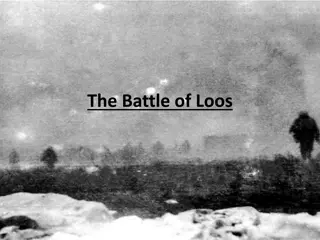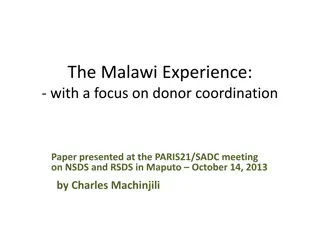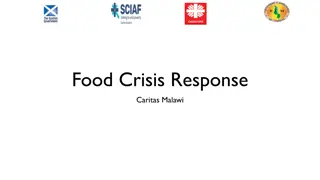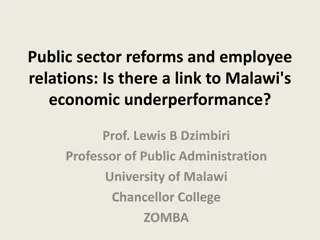Scotland Malawi Partnership & Scottish Fair Trade Forum Sustainable Economic Development Strand Meeting (9th November 2017)
The Scotland Malawi Partnership and Scottish Fair Trade Forum held a meeting focusing on sustainable economic development in Malawi, with a panel discussing opportunities for value chain addition in the agriculture sector. The panel highlighted locally produced materials, market access, increased production, and diversification as key factors. They also emphasized the need for government support, conducive environments, reduced taxes, and investments to empower local producers and enhance economic growth. Additionally, the Ministry of Finance and Economic Development is addressing climate change risks in national strategies.
Download Presentation

Please find below an Image/Link to download the presentation.
The content on the website is provided AS IS for your information and personal use only. It may not be sold, licensed, or shared on other websites without obtaining consent from the author. Download presentation by click this link. If you encounter any issues during the download, it is possible that the publisher has removed the file from their server.
E N D
Presentation Transcript
Scotland Malawi Partnership & Scottish Fair Trade Forum Sustainable Economic Development Strand Meeting 9th November 2017
Malawian input panel Malawi Panel: Adwell Zembere, Strand lead for Ministry of Finance and Economic Development Allan Jere, Ministry of Finance and Economic Development Kondwani Kaunda, Malawi Economic Justice Network Charles Kasambala, Centre for Legal Assistance Phillip Kamangila, Activist
Questions for Malawi Panel Question: What are the main opportunities for value chain addition in the agriculture sector in Malawi? Answers: Locally produced materials and access to markets Access to markets for the value added products Increased production e.g. maize, cassava, pulses, oilseed crops have seen a surge in agri output 2. Diversified demands of end product... For instance maize- not all of us want maize for nsima, we could take advantage of breakfast cereals, 3. Changing demands of end users- some want soya bean for nutritional reasons, some for soil fertility improvement some for seed, some for export.. 4. Specialised traits of some produce eg. You have groundnut varieties specifically for oil vs non oil. 5. Availability of well trained personnel- can also be an opportunity 6. Availability of funds/donor support whose interest are in value addition I see a lot of potential for Malawi's agriculture sector. For one we have moderate weather which favours cultivation of a variety of farm produce. Then our alluvial soils also are a great advantage. Let alone the availability of water in rivers which can be used for irrigation purposes. In terms of value addition, we have a great demand of food products. If we concentrated on improving production, then also encourage investments in agri industries for end products to supply the domestic market primary. There is just great potential for more. [Continued on next page]
Questions for Malawi Panel Question: What are the main opportunities for value chain addition in the agriculture sector in Malawi? Answers (continued): 1. Invite investors to empower many Malawians to start packing their products e.g. peacock seeds, mangoes, tomatoes 2. Government should provide conducive environment like setting up cooperatives to process their own products 3. Remove or extremely reduced taxes because markets are good niches to conduct economic activities 4. More profit, more employment opportunities with enabling local demand and supply chain 5. Forex reserves due to exports of things that are locally produced and packaged by a number of Malawians within the country
Questions for Malawi Panel Question: To what extent has the Ministry of Finance and Eco Dev assessed the risks of climate change and water and security on economic growth? Answers: Actually, the national energy strategy has climate change as its main focus.
Questions for Malawi Panel Question: What are the barriers and opportunities for micro finance in Malawi? Answers: One of the barriers in micro finance particularly for rural is lack of legal framework which can guide them as they want to access to the financial resources. For example, when people in rural areas want to trade with banks they need to be registered and it s very difficult for them to get through this process as they need a lot of documentation which makes it hard to get the actual registration. In addition even those have tried to mobilise themselves into groups to trade the banks to not recognise them based on the current regulations. Another issue to take into consideration is the higher risk of default which translates to highest interest premiums charged on credit in the Micro finance sector. In addition to risk the administration cost per loan is high in microfinance considering that most loads are very small in value. Again, access to capital is a challenge as such most players fail to sustain themselves. The payroll deduction management system in civil service has reduced the cost per loan for those in payroll lending though. [continued next page]
Questions for Malawi Panel Question: What are the barriers and opportunities for micro finance in Malawi? Answers (continued): Six barriers and opportunities for microfinance: Collateral; Repayment defaulters; Policy environment for SMEs; Credit reference services; Limited service providers; Interest rates Refuse of make deliberate efforts not to accept some policies that control weaker economies from developing competitive markets. Furthermore, the buyer should not determine the price of things e.g. tobacco at auction floors, the prices should not be determined by the buyers. Even though the Malawi economy is Agrobased but the same products like rice, tea, beans, cotton, etc, fetch good prices on international market but why does Malawi still struggle with its economy. There are many countries in the world that depend on Agriculture and are doing well. Therefore, Malawi should look at its policy on agriculture policies. There should be a paradigm shift from importing to exporting things. The items that are imported are produced by countries that give Malawi international aid e.g. China or Japan. These donors encourage Malawians to import their own products like second hand cars and Malawi becomes a dumping place *MALAWI should scrutinize those nations that bring aid to the country because international aid normally has strings attached, i.e. to take raw materials out of the country at a cheaper price, or employ their own people, they divert taxes e.g. Kayerekera Mines, Airtel, etc.
Questions for Malawi Panel Question: What policies has the Malawian Government developed for managing water resources? And what infrastructure exists to deliver the strategies? Answers: We have the water and sanitation policy that is backed by the Water Resources Act 2013/14. Other policies include the Health Sector Strategy that compliments the sanitation aspect. Also available are other implementation guides.
Questions for Malawi Panel Question: What do you see as the internal/external barriers to SME growth within Malawi? Answers:
Questions for Malawi Panel Question: Has the Economic Development Policy been finalised? Answers:
Questions for Malawi Panel Question: How did the Government of Malawi decide upon their key areas of priority? Was there much consultation with Malawian NGOs? Answers: I would say there has been an attempt for the government to consult many different stakeholders. Perhaps the question to ponder is if we have given more time to engage as wide as possible such that we avoid turning these into boardroom events. To a larger extent the expectation from the government is that CSOs/ NGOs have grassroots connections and mandate, hence representative of the opinions and aspirations of the masses. That is perhaps one of the biggest challenge in that it may not be the case.
Questions for Malawi Panel Question: How did the Government of Malawi decide upon their key areas of priority? Was there much consultation with Malawian NGOs? Answers [continued]: The answer is both yes and no. However most of these policies are formulated by Consultants with little or no input from NGOs. For instance, the Land Policy has caused a lot of suffering among Malawians. Secondly, the 2005 Prison Bill had no contribution from NGOs and the current one had very little contribution. Thirdly, the electoral process has not been transparent in the sense that the Bills are facing obstructions to be tabled in Parliament. Fourthly, Gender Policy in Malawi met a lot of resistance from the public because of limited consultation and mostly, it was only women organisations with help from international community that formulated policies Fifth point is to do with Access to Information Bill. There has been literally limited engagement. In conclusion, there has been a problem to harmonise the existing laws due to limited consultations.
Questions for Malawi Panel Question: To what extent have the priorities of the Malawian Government been shaped by Malawian civic society? Answers: Through various networks like Civil Society Network for Agriculture and Water and Sanitation Network and others the Government engaged with the networks to get feedback on the Malawian priorities
Questions for Malawi Panel Question: What exactly does capacity building mean? Answers: Capacity building is many forms as follows: 1. You do capacity in terms training people in new technology to bring a certain change - could be new way of farming to still harvest enough in the advent of climate change. 2. Knowledge on group dynamics and leadership which help communities to work well in various initiatives to ensure sustainability and good governance 3. In some cases it is things like building in cases of class rooms. For example if young boys and girls are learning in new classrooms the capacity of the community will be enhanced once they complete their education. [Continued next page]
Questions for Malawi Panel Question: What exactly does capacity building mean? Answers [continued]: Capacity building can be seen from the technical, financial and human aspects. Capacity building can include all resources that can help to empower or contribute that the programme can be a success and be sustainable when the donors leave.
Questions for Malawi Panel Question: We are using Whatsapp in this meeting. How important do you feel increased connectivity is for Malawi? Answers: We have reached a point where connectivity is no longer a luxury but a necessity for doing business successfully. We have an entire section for e-business in the office of the President and Cabinet and the Ministry of Information is currently overseeing three big projects on connectivity all aimed at improving the same. However, for the civil service a lot of work will need to be done to change the mindset of end users.
Questions for Malawi Panel Question: What is needed to drive the economy in Malawi away from International Aid? Answers: 1. Industrialisation because Malawi is now agrobased 2. Raise awareness among Malawians to know about the benefits of buying local products (buy Malawian strategy) 3. Encourage entrepreneurship because people will depend on self-employment rather than being employed in sectors/NGOs/companies that are fully funded by international donors
Questions for Malawi Panel Question: How is the MG Export Strategy developing? What currently are the main directions/aims? Answers:
Questions for Malawi Panel Question: What is the biggest impediment to successful partnerships between Malawian and Scottish organisations? Answers: The biggest impediment would be management of expectations especially from the Malawian organisations. Most times organisations here expect monetary support and if that isn t forthcoming a partnership is deemed useless. This is a critical element the MaSP will be addressing in the next couple of years to ensure partnership is centered around cooperation. Also, we are using the Partnership Principles. These will ensure that there is mutual respect and the Malawian counterparts have a sense of pride knowing that they are also having an impact on their partner. Communication is one of the biggest challenges for Malawians living in remote areas as the internet access is difficult and expensive. Otherwise once the partnership has been established and communication is easy it is easy to move forward. In some cases Malawian part think that they are on the receiving end: they look for partnerships to ask for financial material instead of a trade partnership where there is a win win situation. [Continued next page]
Questions for Malawi Panel Question: What is the biggest impediment to successful partnerships between Malawian and Scottish organisations? Answers: Not much impediments because both countries can benefit from each other in terms of knowledge and expertise. The partnership can open new ways/avenues of collaboration The partnership can encourage exchange programmes between the two countries to avoid one partner to have monopoly of knowledge and experience The partnership can assist to learn from past mistakes of other partnerships in Malawi The partnership should look more at programmes than projects The partnership should bear in mind that some programmes are meant for service provision as opposed to issues of sustainability
Questions for Malawi Panel Question: Why is the Malawian Government keen on renewable energy projects that are not solar? Is this because the success of solar in Malawi is limited? Answers: So far the biggest energy project is one by Millenium Challenge which was started around 2006 but all in all most of the ones we have are donor funded. As to the extent of being imposed that am not sure and it s only recent that solar has emerged. One of the issues would be that initial investment on solar for most sectors say water is expensive. This is why the focus is skewed towards non solar renewable sources. So far solar products are very expensive and targeted at individual basis. There is a feeling that you can not do much with solar energy; its limited. They may be looking at other renewable energy that have potential to benefit more people at once. Again some solar products have been fake not helping local people. Despite having a challenge of electricity in the country few people even those who are educated are not using solar energy - this is due to lack of knowledge among the people. For instance we had a march yesterday organised by Csos against the persistent black outs (we are.going at times for 25 hours without electricity). Most people questioned the focus of the march arguing whether or not it should have been about making alternative energy sources.accessible to all by for instance removing tax.on the product [Continued next page]
Questions for Malawi Panel Question: Why is the Malawian Government keen on renewable energy projects that are not solar? Is this because the success of solar in Malawi is limited? Answers: Solar is expensive to be purchased by majority of Malawians and maintenance could be a challenge. Malawians are not empowered how to use and maintain the solar system. Malawi does not produce solar equipment and it means forex will be spent as a country. Malawi will need to hire experts to maintain the facilities. Solar system has limited supply of power and cannot supply for other electrical appliances. Renewable energy has not, unfortunately, been given much attention.
Scotland Malawi Partnership & Scottish Fair Trade Forum Sustainable Economic Development Strand Meeting 9th November 2017
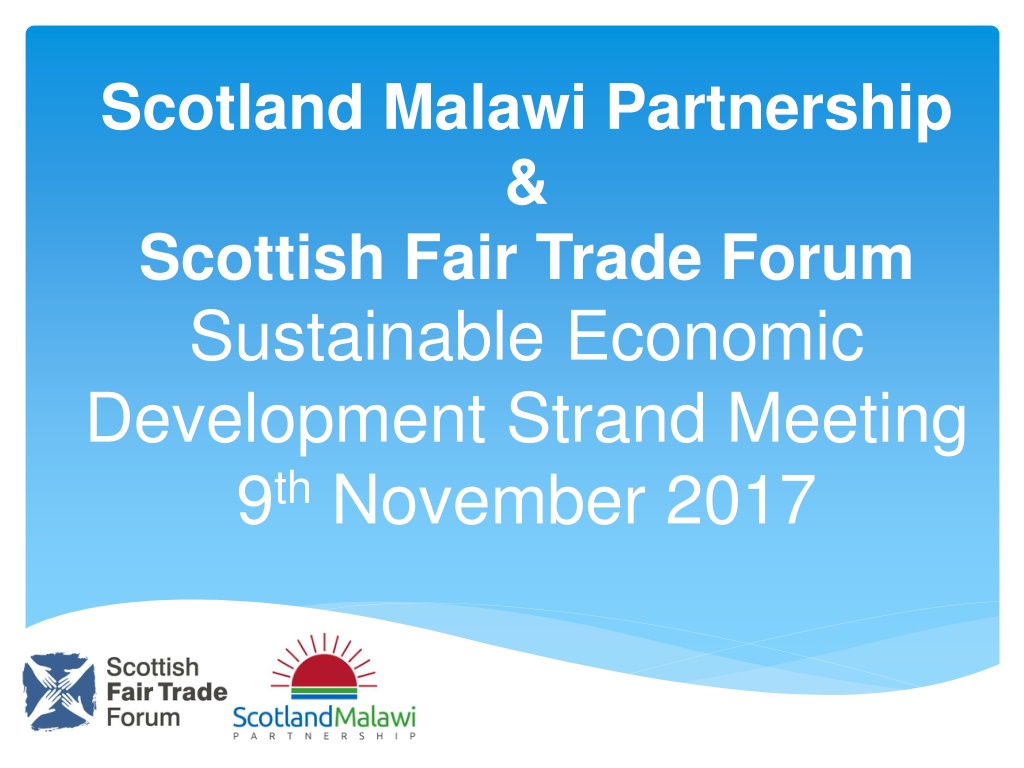
 undefined
undefined









